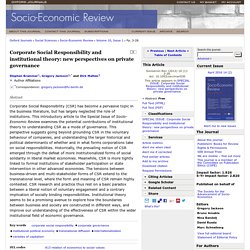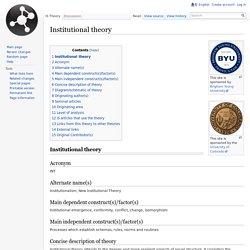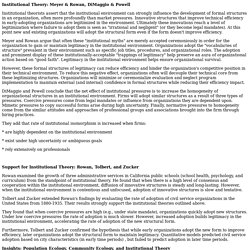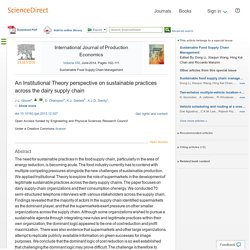

Corporate Social Responsibility and institutional theory: new perspectives on private governance. + Author Affiliations ↵*Correspondence: gregory.jackson@fu-berlin.de Corporate Social Responsibility (CSR) has become a pervasive topic in the business literature, but has largely neglected the role of institutions.

This introductory article to the Special Issue of Socio-Economic Review examines the potential contributions of institutional theory to understanding CSR as a mode of governance. This perspective suggests going beyond grounding CSR in the voluntary behaviour of companies, and understanding the larger historical and political determinants of whether and in what forms corporations take on social responsibilities. Historically, the prevailing notion of CSR emerged through the defeat of more institutionalized forms of social solidarity in liberal market economies.
JEL classification © The Author 2012. Institutional Theory and Entrepreneurship: Where Are We Now and Where Do We Need to Move in the Future? Institutions and institutional theory. Institutional Theory and Organizational Change. Whether or not they are aware of it, managers do not fully control the nature and timing of their decisions.

Their framework of action is limited by institutional constraints in the surrounding environment – what is technically, economically, socially and culturally possible in different contexts. With a better understanding of their environment – and how it affects how they think, what they do and why they do it – decision-makers are also better able to make more carefully considered decisions about organizational change. In this book Staffan Furusten discusses why it is difficult for organizations around the world to resist the pressures of the institutional environment and how organizations worldwide – big and small, private and public – are becoming increasingly alike. Approaching Adulthood: The Maturing of Institutional Theory on JSTOR. Institutional theory and human resource management. Institutional theory - IS Theory. Institutional theory Acronym Alternate name(s) Institutionalism, New Institutional Theory Main dependent construct(s)/factor(s) Institutional emergence, conformity, conflict, change, isomorphism Main independent construct(s)/factor(s) Processes which establish schemas, rules, norms and routines Concise description of theory Institutional theory attends to the deeper and more resilient aspects of social structure.

Source: Scott, W. TheoriesOfInstitutions. Meyer 6. Fulltext. Thoenig.revised.Peters Pierre. Hal PDF. Pw 69. An Error Occurred Setting Your User Cookie. Institutional theory. Institutional Theory. Institutional Theory: Meyer & Rowan, DiMaggio & Powell Institutional theorists assert that the institutional environment can strongly influence the development of formal structures in an organization, often more profoundly than market pressures.

Innovative structures that improve technical efficiency in early-adopting organizations are legitimized in the environment. Ultimately these innovations reach a level of legitimization where failure to adopt them is seen as "irrational and negligent" (or they become legal mandates). At this point new and existing organizations will adopt the structural form even if the form doesn't improve efficiency. Meyer and Rowan argue that often these "institutional myths" are merely accepted ceremoniously in order for the organization to gain or maintain legitimacy in the institutional environment. However, these formal structures of legitimacy can reduce efficiency and hinder the organization's competitive position in their technical environment. 205670186b. An Institutional Theory perspective on sustainable practices across the dairy supply chain.
Open Access Abstract The need for sustainable practices in the food supply chain, particularly in the area of energy reduction, is becoming acute.

The food industry currently has to contend with multiple competing pressures alongside the new challenges of sustainable production. We applied Institutional Theory to explore the role of supermarkets in the development of legitimate sustainable practices across the dairy supply chains. The paper focuses on dairy supply chain organizations and their consumption of energy.
Keywords Institutional Theory; Retailers; Energy use practices; Supply chain 1. The need for sustainable practices in the food supply chain is becoming acute (Dairy Road Map, 2008). Specifically, this study explores how sustainable practices become legitimized in the dairy supply chain in the United Kingdom (UK). Scapens%20%26%20Varoutsa%202010.